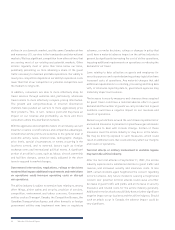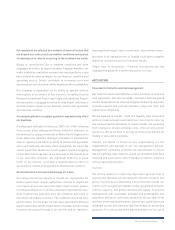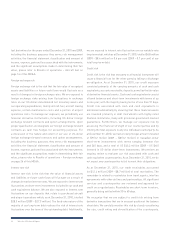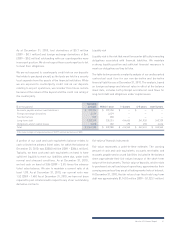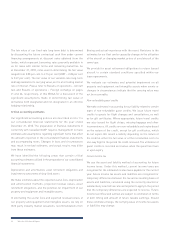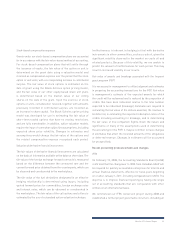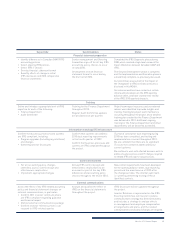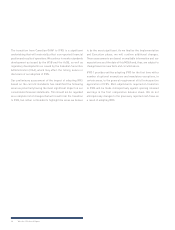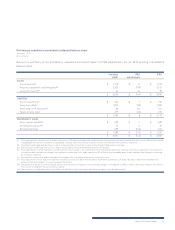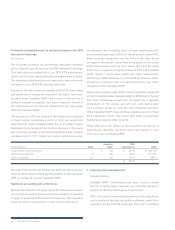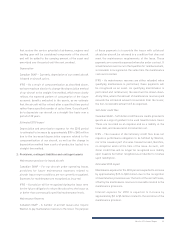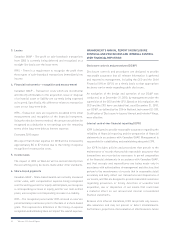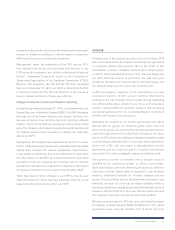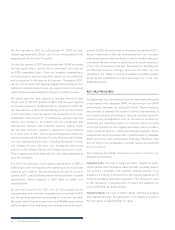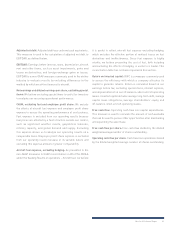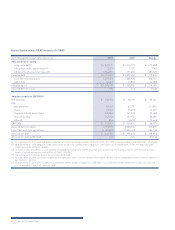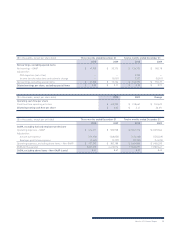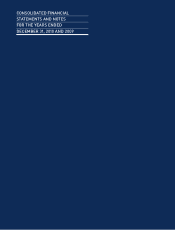Westjet 2010 Annual Report Download - page 50
Download and view the complete annual report
Please find page 50 of the 2010 Westjet annual report below. You can navigate through the pages in the report by either clicking on the pages listed below, or by using the keyword search tool below to find specific information within the annual report.
48 WestJet 2010 Annual Report
Preliminary unaudited impact to certain line items on the 2010
statement of earnings
($ in millions)
The following illustrates our preliminary unaudited estimated
pre-tax impact to specific items on our 2010 statement of earnings.
This table does not present all of our 2010 IFRS adjustments,
rather, only the most significantly affected expenses are included.
The remaining adjustments are not expected to have a material
net impact on our 2010 IFRS earnings before tax.
As noted in the table below, our estimated 2010 IFRS depreciation
and maintenance charges are expected to be higher than those
recorded under Canadian GAAP. This increase is due strictly to
timing of expense recognition, and overall expenses related to
the maintenance of our fleet will ultimately be the same under
IFRS and Canadian GAAP.
The increases in 2010 are related to the timing and recognition
of major engine maintenance costs for both our owned and
leased aircraft. Under Canadian GAAP, the costs of major engine
maintenance are recognized as incurred. Because of the young
age of our fleet, we have not performed significant levels of engine
overhauls prior to 2011. Under our current maintenance plan,
we anticipate that increasing levels of major maintenance will
be performed beginning in 2013. For leased aircraft, under IFRS,
these costs are recognized over the term of the lease based
on usage of the aircraft, rather than being based on the actual
maintenance event occurring. As a result, there will be timing
differences in expense recognition between IFRS and Canadian
GAAP, where in years when significant major maintenance
events occur, IFRS maintenance costs would be otherwise lower,
assuming a consistent fleet size and composition, than those
recognized under Canadian GAAP.
Depreciation expense under IFRS is also increased as compared
to that recognized under Canadian GAAP in 2010, due to the fact
that major maintenance events are recognized as a separate
component of the overall aircraft cost, and depreciated
over a shorter useful life until the next scheduled overhaul.
Under Canadian GAAP, these overhaul expenses would not have
been capitalized, rather, they would have been recognized as
maintenance expense when incurred.
These differences are related to the accounting recognition of
expenditures; therefore, we do not expect any changes in cash
flows as a result of adopting IFRS.
We expect that income tax expense for 2010 will decrease as a
result of lower expected 2010 earnings before income tax under
IFRS, as compared to under Canadian GAAP.
Significant accounting policy differences
We have identified the following significant differences between
our current accounting policies and those required or expected
to apply in preparing IFRS financial statements. The estimated
impact for 2010 is discussed for certain of these differences.
1. Property, plant and equipment
Componentization
Canadian GAAP – Maintenance and repair costs for owned
aircraft, including major overhauls, are currently charged to
expense at the time maintenance is performed.
IFRS – Each item of property and equipment with a significant
cost in relation to the total cost and/or a different useful life is
required to be depreciated separately. The costs of activities
($ in millions) Note
Canadian
GAAP
IFRS
adjustments IFRS
Depreciation and amortization 1 $ 133 $ 35–40 $ 168–173
Maintenance expense 2 100 15–20 115–120
Interest expense 2, 4 60 8–12 68–72
$ 58–72


